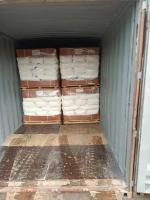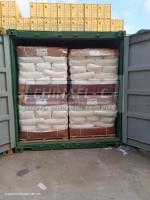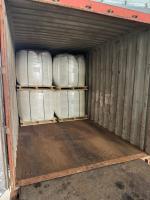Our Products
Polyacrylamide / equivalent model of MasterRoc SWA 710 anionic polyacrylamide can be replaced by EM3018

Introduction
Anionic polyacrylamide (APAM) is a high molecular weight, water-soluble synthetic polymer used widely as a flocculant, dispersant, and thickener. One of the specialized products in this class is MasterRoc SWA 710, an anionic polyacrylamide developed by Master Builders Solutions (formerly part of BASF). MasterRoc SWA 710 is primarily designed for tunneling and underground construction, where water control, soil conditioning, and process efficiency are essential.
This article explains the main application of MasterRoc SWA 710 in detail, covering its role in tunnel boring machine (TBM) operations, its interaction with soils, and its benefits in ground conditioning, while also highlighting secondary applications in construction, mining, and dewatering processes.
1. What Is MasterRoc SWA 710?
MasterRoc SWA 710 is an anionic polyacrylamide formulated specifically for soil conditioning in tunnel boring machine operations. It typically appears as a powder or granule and is dissolved in water to form a working solution. Once in solution, it interacts with clayey, sandy, or silty soils, modifying their rheological and physical properties to improve excavation efficiency.
Key characteristics:
-
High molecular weight
-
Strong anionic charge
-
Excellent water solubility
-
Effective interaction with fine particles and clays
-
Compatible with foaming agents (MasterRoc SLF series)
2. Main Application: Tunnel Boring Machine (TBM) Soil Conditioning
2.1 The Role of Soil Conditioning
In modern tunneling using Earth Pressure Balance (EPB) or Slurry Shield TBMs, soil conditioning is a critical step. As the TBM advances, the excavated soil must be transported from the cutting head to the conveyor or slurry system. Poorly conditioned soils can lead to:
-
High cutterhead torque
-
Inadequate face pressure
-
Cutterhead clogging
-
Excessive wear and tear
-
Settlement of ground above the tunnel
To mitigate these issues, additives like MasterRoc SWA 710 are injected into the soil ahead of the TBM or directly into the working chamber to alter its behavior, improving performance and safety.
2.2 How MasterRoc SWA 710 Works
MasterRoc SWA 710, as an anionic polyacrylamide, primarily functions by modifying the interaction between water and soil particles.
Mechanism:
-
Its long polymer chains entangle with fine particles (e.g., clays).
-
The negative charge of APAM neutralizes surface charges, promoting aggregation.
-
It enhances the binding of water to the soil matrix, increasing plasticity.
-
The result is a cohesive, paste-like soil structure with reduced permeability.
The polymer acts as a soil binder, making soils less sticky, more manageable, and more flowable within the TBM chamber.
2.3 Benefits in TBM Operations
The use of MasterRoc SWA 710 in TBM soil conditioning offers a wide range of operational and technical benefits:
-
Reduced Friction: Treated soils flow more easily through screw conveyors and piping.
-
Improved Stability: Aids in maintaining the pressure at the face, preventing collapse or over-excavation.
-
Minimized Adhesion: Decreases stickiness of clay-rich soils on metal components.
-
Enhanced Wear Protection: Limits abrasive contact on cutter tools and screw conveyors.
-
Better Control: Promotes more predictable soil behavior, improving excavation accuracy.
-
Lower Energy Consumption: Reduced torque and thrust due to smoother soil flow.
-
Environmental Compliance: Formulated for minimal toxicity and lower ecological impact.
MasterRoc SWA 710 is typically used in combination with foaming agents (such as MasterRoc SLF 41 or SLF 50) for composite soil conditioning, ensuring the right texture, viscosity, and water retention in varying geological conditions.
3. Application Methods in Tunneling Projects
MasterRoc SWA 710 is dissolved in water using specialized mixing equipment and dosed via:
-
Injection ports at the TBM cutterhead
-
Screw conveyor injection lines
-
Conditioning chambers or mixing boxes
Dosage is based on:
-
Soil type (clayey, silty, sandy)
-
Soil moisture content
-
TBM advancement rate
-
Environmental factors (temperature, groundwater)
Jar testing and pilot mixing are often conducted to determine the optimal concentration, typically ranging between 0.1% to 0.5% active polymer in the slurry or water.
4. Secondary Applications of MasterRoc SWA 710
While TBM soil conditioning is the primary use, MasterRoc SWA 710 and similar anionic polyacrylamides also find secondary applications in other civil and mining projects:
4.1 Slurry Management and Sediment Control
In construction dewatering, mining tailings management, or drainage tunnels, the polymer can be used to:
-
Flocculate fine solids from suspension
-
Improve settling in sedimentation tanks
-
Reduce turbidity in discharge water
This ensures cleaner effluent and faster processing of waste materials.
4.2 Dust Suppression and Soil Stabilization
In open construction areas or mining sites, MasterRoc SWA 710 can be applied to stabilize surfaces by:
-
Binding soil particles to prevent wind erosion
-
Reducing water evaporation and runoff
-
Enhancing compactability of treated soil
It is often sprayed onto surfaces in dilute solution form.
4.3 Drilling Mud Additive
Although not a primary drilling fluid, MasterRoc SWA 710 may be added to horizontal directional drilling (HDD) or microtunneling fluids to:
-
Increase viscosity
-
Reduce fluid loss into porous formations
-
Enhance cuttings suspension and transport
5. Environmental and Safety Considerations
MasterRoc SWA 710 is formulated for low toxicity and biological compatibility, making it suitable for projects near sensitive environments such as rivers, aquifers, or urban populations.
Key environmental advantages:
-
Minimal acrylamide monomer content (typically <0.05%)
-
Biodegradable over time
-
No persistent bioaccumulative effects
-
Approved for use in many regions under tunneling environmental guidelines
However, proper storage and handling are essential:
-
Store in dry, cool conditions
-
Avoid direct inhalation of dry powder
-
Prepare only the needed volume of solution to avoid degradation
6. Comparison with Other Conditioning Agents
Compared to other conditioning additives like bentonite, synthetic foams, or lubricants:
-
MasterRoc SWA 710 provides stronger flocculation, especially with clay particles.
-
It requires lower dosage for the same effect.
-
It offers better control over soil plasticity, particularly in mixed-face geology.
-
However, it may be less effective in purely sandy soils unless combined with other agents.
For optimal performance, it is often used in blended systems tailored to project-specific soil conditions.





